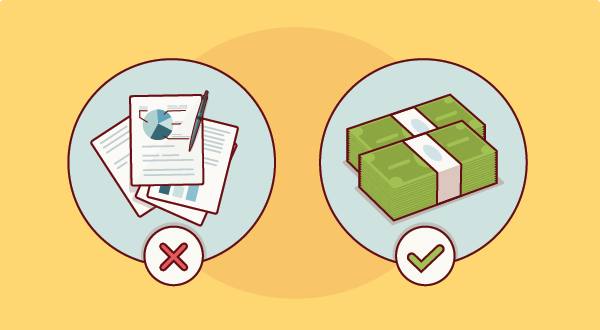Wil Schroter

Paying people with equity is synonymous with startups.
Founders love being able to buy things with Monopoly money and newly granted shareholders dream of a huge windfall someday. And that sounds awesome.
But the problem is that equity isn't like cash — it's far more valuable, yet we tend to spend it like it's free. We later come to learn that equity is not only expensive now, it's way more expensive later as the company grows, and we now hold less of it.
What's so bad about paying with equity?
It's not a bad idea if we value it properly. But that's the problem. Equity, especially in the early days, is often spent with little consideration for it's long term value.
"I'll design your mobile app for 10% of the company" might sound like a deal now when we have no money, but 10% of the company isn't just about today's value — that's 10% of the company FOREVAHHHHHH.
We're basically saying "If you do this work today, I will pay you back a percentage of my work every day for the rest of my life" (in this case the lifespan of the company!). Unlike cash, equity doesn't get replenished, so there's no such thing as a one-time payment.
Well if we don't have the cash, what other choice do we have?
We should consider a combination of future cash payments as an equity deferral.
For example, if we were going to pay $10,000 for a service, we should give ourselves the option to pay the balance back in cash over some period of time to cut down the cost of equity.
Remember, the default is to give it away as all equity anyhow, so even if it takes us 2 years to pay in cash, it's still faster than the equity will ever become liquid.
How do I know the equity was well spent?
There's no hard and fast rule here, but a few good guidelines certainly exist.
First, if we're going to make an investment, we should make sure we're always using a "cash equivalent" price. Paying someone a percentage of the company is almost never a "cash equivalent" price because it's often an arbitrary percentage to begin with.
If someone is providing $10,000 worth of services in the cash-equivalent, we should be paying them $10,000 of stock, with additional stock to make up for the increased risk.
Second, we want to use equity when we think it can produce ongoing dividends. That might include building a product that will generate more money or hiring someone that can grow revenue.
If we're paying for rent, customer support, or "advisor services" in pure equity, those will likely feel like one time benefits that are hard to translate into more revenue.
Equity is the most expensive money we will ever spend because it represents 100% of our own future return.
While we don't want to be entirely stingy, we need to be very frugal, because every dollar we spend today reduces the many dollars we may ever see in the future.
In Case You Missed It
Startup Equity 101. Get a crash course into startup equity broken down into easy-to-understand concepts by our team.
How to Assign Stock Options. Stocks are a whole world unto themselves, complete with new vocabulary, confusing math, and complicated issues to consider. Check out this startup stock options 101 primer to get you going.
Equity Doesn’t Mean Equal. Chances are a 50/50 split is a bad deal for one person — the person who will contribute more value over the long haul. Fortunately, there are a few ways to address the split differently.
No comments yet.
Upgrade to join the discussion.
Already a member? Login
